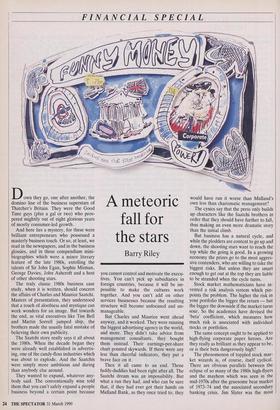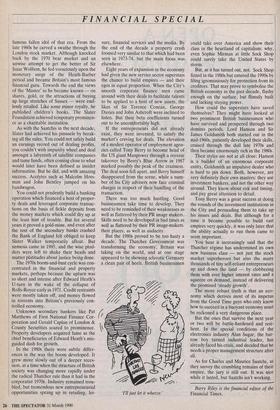FINANCIAL SPECIAL
A meteoric fall for the stars
Barry Riley
Down they go, one after another, the domino line of the business superstars of
• Thatcher's Britain. They were the Good Time guys (plus a gal or two) who pros- pered mightily out of eight glorious years of mostly consumer-led growth.
And here lies a mystery, for these were brilliant entrepreneurs who possessed a masterly business touch. Or so, at least, we read in the newspapers, and in the business glossies, and in those compendium mini- biographies which were a minor literary feature of the late 1980s, extolling the talents of Sir John Egan, Sophie Mirman, George Davies, John Ashcroft and a host of other shooting stars.
The truly classic 1980s business case study, when it is written, should concern the affairs of Charles and Maurice Saatchi.
Masters of presentation, they understood that a touch of aloofness and mystique can work wonders for an image. But towards • the end, as vital executives like Tim Bell and Martin Sorrell jumped ship, the brothers made the usually fatal mistake of believing their own publicity.
The Saatchi story really says it all about the 1980s. When the decade began they were already well established in advertis- ing, one of the candy-floss industries which was about to explode. And the Saatchis were simply more ambitious and daring than anybody else around.
They wanted to expand, whatever any- body said. The conventionally wise told them that you can't safely expand a people business beyond a certain point because you cannot control and motivate the execu- tives. You can't pick up subsidiaries in foreign countries, because it will be im- possible to make the cultures work together. And you can't add on other services businesses because the resulting structure will become unfocused and un- manageable.
But Charles and Maurice went ahead anyway, and it worked. They were running the biggest advertising agency in the world, and more. They didn't take advice from management consultants, they bought them instead. Their earnings-per-share chart pointed skywards. If there were any less than cheerful indicators, they put a brave face on it.
Then it all came to an end. Those fuddy-duddies had been right after all. The Saatchi dream was an impossibility. But what a run they had, and who can be sure that, if they had ever got their hands on Midland Bank, as they once tried to, they would have run it worse than Midland's own less than charismatic management?
The cynics say that the press only builds up characters like the Saatchi brothers in order that they should have further to fall, thus making an even more dramatic story than the initial climb.
But business has a natural cycle, and while the plodders are content to go up and down, the shooting stars want to reach the top while the going is good. In a growing economy the prizes go to the most aggres- sive contenders, who are willing to take the biggest risks. But unless they are smart enough to get out at the top they are liable to be stranded when the cycle turns.
Stock market mathematicians have in- vented a risk analysis system which pin- points the problem. The higher the risk in your portfolio the bigger the return — but the bigger the downside if the market turns sour. So the academics have devised the `beta' coefficient, which measures how much risk is associated with individual stocks or portfolios.
The same concept ought to be applied to high-flying corporate paper heroes. Are they really as brilliant as they appear to be, or is their beta dangerously high?
The phenomenon of toppled stock mar- ket wizards is, of course, itself cyclical. There are obvious parallels between the eclipse of so many of the 1980s high-flyers and the mayhem which was seen in the mid-1970s after the gruesome bear market of 1973-74 and the associated secondary banking crisis. Jim Slater was the most
FINANCIAL SPECIAL
famous fallen idol of that era. From the late 1960s he carved a swathe through the London stock market. Although knocked back by the 1970 bear market and an unwise attempt to get the better of Sir Isaac Wolfson, he fed voraciously upon the monetary surge of the Heath-Barber period and became Britain's most famous financial guru. Towards the end the views of the 'Master' as he became known — on shares, gold, or the attractions of buying up large stretches of Sussex — were end- lessly retailed:Like some minor royalty, he published children's books. The Slater Foundation achieved temporary prominen- ce as a charitable institution.
As with the Saatchis in the next decade, Slater had achieved his pinnacle by break- ing all the rules. You could not safely build an earnings record out of dealing profits, you couldn't with impunity wheel and deal amongst a labyrinth of satellite companies and tame funds, often coming close to what would later have been defined as insider information. But he did, and with amazing success. Acolytes such as Malcolm Hors- man and John Bentley jumped on his bandwagon.
You could not prudently build a banking operation which financed a host of proper- ty deals and leveraged corporate transac- tions on the basis of fickle deposits from the money markets which could dry up at the least hint of trouble. But for several years it proved a gold-mine, and even after the rest of the secondary banks crashed the Bank of England felt obliged to keep Slater Walker temporarily afloat, But nemesis came in 1985, and the wise plod- ders were left to shake their heads and mutter platitudes about justice being done.
The 1970s boom-and-bust cycle was con- centrated in the financial and property markets, perhaps because the upturn was so short and intense after Edward Heath's U-turn in the wake of the collapse of Rolls-Royce early in 1971. Credit restraints were mostly taken off, and money, flowed in torrents into Britain's previously con- trolled economy.
Unknown secondary bankers like Pat Matthews of First National Finance Cor- poration and Gerald Caplan of London & County Securities soared to prominence. Property developers acquired fame as the chief beneficiaries of Edward Heath's mis- guided dash for growth.
In the 1980s there were subtle differ- ences in the way the boom developed. It grew more slowly out of a deeper reces- sion, at a time when the structure of British society was changing more rapidly under the radical Thatcher rule than it had in the corporatist 1970s. Industry remained trou- bled, but tremendous new entrepreneurial opportunities sprang up in retailing, lei- sure, financial services and the media. By the end of the decade a property crash loomed very similar to that which had been seen in 1973-74, but the main focus was elsewhere.
Eight years of expansion in the economy had given the new service sector superstars the chance to build empires — and their egos in equal proportion. When the City's smooth corporate finance men came around with their deals to facilitate talents to be applied to a host of new assets, the likes of Sir Terence Conran, George Davies and John Ashcroft were inclined to listen. But their beta coefficients turned out to be uncomfortably high.
If the entrepreneurs did not already exist, they were invented, to satisfy the market's craving for deals. The elevation of a modest operator of employment agen- cies called Tony Berry to become head of the US giant Manpower through a reverse takeover by Berry's Blue Arrow in 1987 marked possibly the peak of the craziness. The deal soon fell apart, and Berry himself disappeared from the scene, while a num- ber of his City advisers now face criminal charges in respect of their handling of the transaction.
There was too much hustling. Good businessmen take time to develop. They need to be reminded of their weaknesses as well as flattered by their PR image makers. Skills need to be developed in bad times as well as flattered by their PR image-makers. their places, as well as audacity.
But the 1980s proved to be too hasty a decade. The Thatcher Government was transforming the economy, Britain was taking on the world, and at one stage appeared to be showing sclerotic Germany a clean pair of heels. British businessmen
Til just let it wheeze.'
could take over America and show their class in the heartland of capitalism: why, even Sophie Mirman at little Sock Shop could surely take the United States by storm.
But, as it has turned out, not. Sock Shop fizzed in the 1980s but entered the 1990s by filing ignominiously for protection from its creditors. That may prove to symbolise the British economy in the past decade, flashy enough on the surface, but flimsily built and lacking staying power.
How could the superstars have saved themselves? They might have looked at two prominent British businessmen who have survived and prospered through two domino periods. Lord Hanson and Sir James Goldsmith both started out in the mid-1960s, patiently developed their skills, cruised through the dull late 1970s and then became enormously rich in the 1980s.
Their styles are not at all close: Hanson is a builder of an enormous corporate entity, Goldsmith an impulsive dealer who is hard to pin down. Both, however, are very definitely their own masters: they use investment bankers, and not the other way around. They know about risk and timing, and pay great attention to detail.
Tony Berry was a great success at doing the rounds of the investment institutions in the City and persuading them to take up his issues and deals. But although for a time it became possible to build vast empires very quickly, it was only later that the ability actually to run them came to seem important.
You hear it increasingly said that the Thatcher regime has undermined its own new business class — not just the stock market superheroes but also the many thousands of tiny self-reliant entrepreneurs up and down the land — by clobbering them with ever higher interest rates and a squeeze on demand, instead of delivering the promised 'steady growth'.
The more robust truth is that an eco- nomy which derives most of its impetus from the Good Time guys who only know how to succeed in a buoyant economy must be reckoned a very dangerous place.
But the ones that survive the next year or two will be battle-hardened and resi- lient. In the special conditions of the electronics industry Alan Sugar, the bar- row boy turned industrial leader, has already faced his crisis, and decided that he needs a proper management structure after all.
As for Charles and Maurice Saatchi, as they survey the crumbling remains of their empire, the jury is still out. It was nice while it lasted, but Saatchi isn't working.
Barry Riley is the financial editor of the Financial Times.



























































 Previous page
Previous page